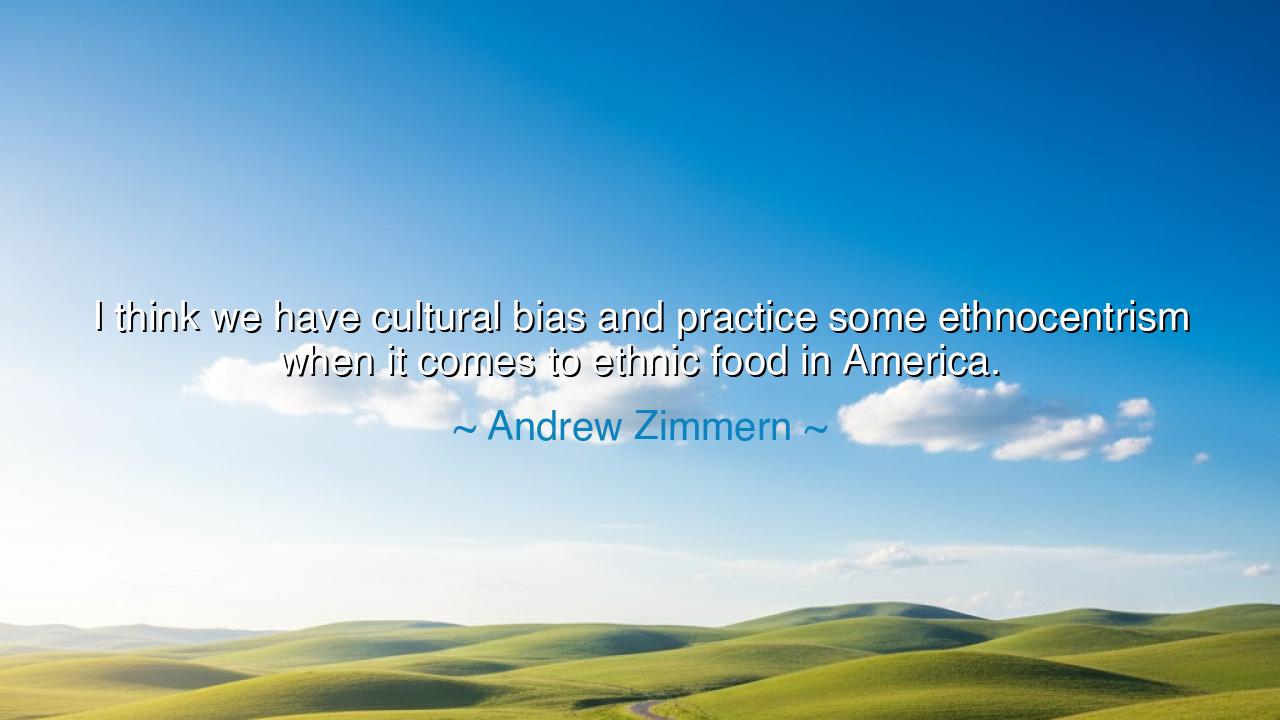
I think we have cultural bias and practice some ethnocentrism
I think we have cultural bias and practice some ethnocentrism when it comes to ethnic food in America.






Host:
The room was quiet, the soft light from the table lamp casting gentle shadows on the walls. Jack was flipping through a magazine, but his attention seemed to be elsewhere, lost in thought. Jeeny, sitting across from him, had just finished a cup of tea, her gaze focused out the window, as if contemplating something deeper. The atmosphere was still, yet there was an undeniable sense that something meaningful was about to be discussed.
Jeeny:
(She looks up from the window, her voice thoughtful but with a hint of curiosity.)
“I came across a quote by Andrew Zimmern today. He said, ‘I think we have cultural bias and practice some ethnocentrism when it comes to ethnic food in America.’ It made me think about how we view different cultures through the lens of our own — especially when it comes to food. Do you think this kind of bias exists in how we perceive ethnic cuisines in America?”
Jack:
(He puts the magazine down, his expression reflective, as he processes her question.)
“That’s a really interesting point. I think there’s definitely a kind of ethnocentrism when it comes to food. In America, we tend to hold our own food traditions — like burgers, pizza, or barbecue — as the gold standard. Meanwhile, cuisines from other cultures are often viewed with a sense of curiosity or skepticism, especially if they’re not as familiar. We’ve grown up with a certain set of foods and flavors, and when something different comes along, it can be hard for some people to fully embrace it.”
Jeeny:
(She nods, her voice calm, almost as if she’s recognizing a deeper truth.)
“Exactly. It’s like we view food from other cultures through the filter of our own preferences, not really considering the history, the significance, or the context behind it. There’s a tendency to simplify or misunderstand ethnic food, because it’s unfamiliar or ‘foreign.’ And that kind of bias can extend to the way people approach other aspects of culture too. When we don’t take the time to really understand and appreciate different food traditions, we miss out on so much.”
Jack:
(He leans back slightly, his voice thoughtful, but almost questioning.)
“I think that’s part of it. We often equate ‘familiar’ with ‘safe’ or ‘normal,’ and anything that challenges that comfort zone — like trying new flavors or ingredients — can feel like a leap. But really, food is such a powerful way to connect with a culture, to understand a different way of life. And yet, we tend to categorize certain cuisines as ‘weird’ or ‘unusual’ just because they don’t align with what we’re used to. It’s a form of cultural bias that limits how we experience the world.”
Jeeny:
(She smiles gently, her voice reassuring, almost as if offering a way forward.)
“Food is such a window into a culture’s values, history, and creativity. If we take the time to step outside of our own culinary comfort zones, we open ourselves up to new experiences, new ways of thinking, and even new ways of connecting with others. We don’t have to like everything, but we should approach it with an open mind, recognizing that just because something is different doesn’t mean it’s less valuable or meaningful.”
Jack:
(He nods, his voice softer, almost as if he’s coming to a realization.)
“Right. It’s about understanding and respect. When we take the time to appreciate the richness behind a dish, we’re not just tasting food — we’re learning about a culture, a history, and a way of life. It’s like food becomes a bridge between people, rather than a point of division. And maybe that’s the first step in addressing broader cultural biases — embracing diversity, starting with something as universal as food.”
Jeeny:
(She smiles, her voice gentle, filled with quiet wisdom.)
“Exactly. It’s the little things that make a big difference. A simple shift in perspective — from judgment to curiosity — can change the way we view the world. When we approach different cultures with an open heart and mind, we can celebrate what makes each one unique instead of letting our own biases hold us back from learning.”
Host:
The room feels quieter now, as Jack and Jeeny reflect on the depth of their conversation. The world outside continues its rhythm, but inside, there’s a shared understanding that food, like culture, is something to be celebrated and explored, not limited by bias or preconceived notions. The true richness of life comes from embracing diversity, recognizing the value in all cultures, and being open to the beauty of what we may not fully understand at first.






AAdministratorAdministrator
Welcome, honored guests. Please leave a comment, we will respond soon